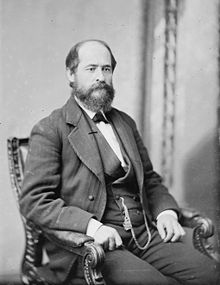Get Today in Masonic History into your Inbox. Sign up today for one of our email lists!
Need an article for your Trestleboard/Newsletter see our Use Policy
Richard Parks Bland is Born

Today in Masonic History Richard Parks Bland is born in 1835.
Richard Parks Bland was an American politician.
Bland was born on August 19th, 1835 in Hartford, Ohio County, Kentucky. Bland came from a prominent Virginia family, both on his mother's and father's sides of the family. Both the families were some of the first to follow Daniel Boone into the wilderness of Kentucky. Despite this fact, Bland's family was extremely poor. Matters were made worse when Bland's father passed away when he was 7 and Bland's mother passed away when he was 14. The orphaned Bland was forced to hire himself out as a farm worker. Despite his financial situation he was able to attend Hartford College and was able to graduate with a teacher's certificate. For two years he taught school in his home town.
In 1855, Bland briefly moved for the first time to Missouri. After teaching school for a year in Missouri he headed to California. There he studied law before moving to the western part of the Utah territory which is now present day Nevada. There he taught school again and tried his hand at prospecting and mining. This began his lifelong interest in mining, particularly with silver mining. In the Utah territory he also continued his study of the law. He passed the bar and begin practicing law in Virginia City and Carson City. Bland also held his first elected office as Treasurer of Carson County, Utah Territory. He ended up losing the position when Nevada became a state and the government was reorganized.
In 1865, Bland returned to Missouri where he opened up a law practice with his brother. The two remained in practice until 1869, when Bland moved to Lebanon thinking the chances of commercial success were better there after new train tracks had been laid through the town.
In 1872, Bland was elected to the United States House of Representatives. Through his 24 years in the United States House of Representatives his main focus was on mining and the currency of the United States. Bland's love of silver and his efforts to help silver miners gained him the nickname "Silver Dick". He was also called the "The Great Commoner for his efforts to help the common man." His most notable legislation in 1878 was the Bland-Allison Act. The act required the United States Treasury to purchase silver and to distribute coins in the form of silver dollars. The act was vetoed by President Rutherford B. Hayes before Congress overturned the veto. From 1873 when he official took office to 1899 he was not in Congress for two years from 1896 to 1898 when he temporarily lost his seat.
It was in 1896, Bland was the potential Democratic nominee. Bland was not very happy about the prospect of being the nominee and was quoted as saying, "I have no desire in this direction. I have no ambition for this nomination and I am afraid my friends, thrusting my personality into this contest may confuse the greater question." As always for Bland the greater question was currency and bimetallism, where currency is defined as equivalent to a certain amount of gold and a certain amount of silver. In the first three ballots at the Democratic Convention, Bland led but did not get the two third majority required. On the fourth the ballot swung to his opponent. Bland was afraid of a split party so he sent a telegram to his supporters, he did not even attend the convention, telling them he was putting his support behind his opponent, the fifth ballot became a formality.
One non political issue came up during Bland's 1896 Democratic presidential nomination bid. Bland, a protestant, married a Catholic and they were raising their children Catholic. This caused derision and bigotry toward Bland by his opponents, to address the issue Bland stated "Yes my wife is a Roman Catholic and I am a Protestant, and shall live and die one; but my regret is that I am not half such a Christian as the woman who bears my name and is the mother of my children."
Bland passed away on June 15th, 1899 while he was still in office.
Bland was a member of Rolla Lodge No. 213 in Rolla, Missouri.
This article provided by Brother Eric C. Steele.
| S | M | T | W | T | F | S |
| 1 | 2 | 3 | ||||
| 4 | 5 | 6 | 7 | 8 | 9 | 10 |
| 11 | 12 | 13 | 14 | 15 | 16 | 17 |
| 18 | 19 | 20 | 21 | 22 | 23 | 24 |
| 25 | 26 | 27 | 28 | 29 | 30 | 31 |
Other Events Today
Johann von Robais, Baron de Kalb Passes Away
Sam Gilbert Bratton is Born
Manuel Luis Quezon y Molina was Born
George Cockburn, 10th Baronet Passes Away

